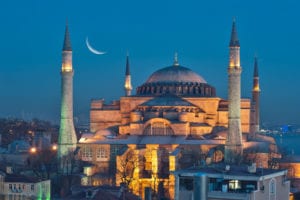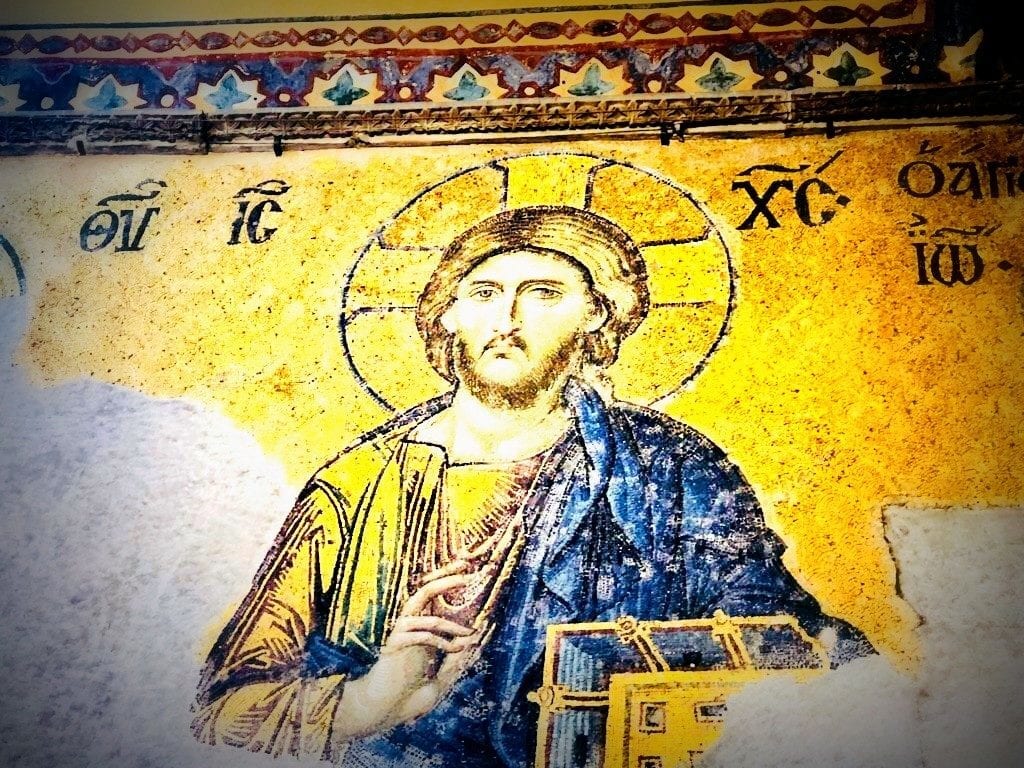Herland Report: The iconic, historic monument, Hagia Sophia in Constantinople, Istanbul is now turned into a mosque, reflecting the Islamist intolerance for religious plurality in the Middle East.

Hagia Sophia is a center piece artwork of Orthodox Christianity, which dominated the Middle East before the Islamic Conquest from the 600s AD onward.
“Sophia” means “divine wisdom” in Greek and the church was completed in 537 AD by the East Roman Emperor Justinian.
(Feature photo Hagia Sophia interior with Hanne Nabintu Herland, who has traveled extensively in the Middle East over many years and works with the Christian minorities in the region.)
In 1453, Mehmed II, who conquered Constantinople and marked the end of the Christian East Roman Byzantine Empire, turned Hagia Sophia into a mosque.
After the Islamic Conquest of the Christian Middle East, the Ottomans built the four minarets we see today.
They also covered Hagia Sophia’s Christian icons and gold mosaics, partly by installing massive Islamic Calligraphy panels over it.
Hagia Sophia has been seen as a symbol of the secular nature of modern Turkey. With the dramatic change in the status of the original Orthodox Christian church, many view it as the Islamist Muslim Brotherhood succeeding in yet another step to reshape Turkey along Islamist radical lines.

“Sophia” means “divine wisdom” in Greek and the church was completed in 537 AD by the East Roman Emperor Justinian.
The Islamist, Wahhabi inspired system of radicalized faith is what characterized the terror group ISIS as well as other US supported groups in the region, that often work as mercenaries on behalf of foreign powers. Turkey’s role in the Syria war also spills into this, and its American support.
The joint US-Saudi effort under crown prince, Mohammad Bin Salman to moderate the literature and Quran versions to de-radicalize its Wahhabi segments, remains to be seen whether is successful or not.
RELATED ARTICLES:
- Islamic Persecution of Christians seldom criticized in the West #Soleimani
- WND features New Left Tyranny: Socialism, globalism and “robbery Capitalism”
- Church burning has come to America, just like ISIS burned churches in the Middle East
- Hanne Nabintu interviews Bishop Harry Jackson: Racial Tribalism leads to hatred, we need Healing
- Global Catastrophe Christian Persecution: 260 Million
In the meantime, it is no secret to anyone that Islamist radicalism is a problem in the world, partly due to its remarkable intolerance against any belief or view that does not display total submission to its own values and ideas.
Protests have been made: “An organization supporting the Ecumenical Patriarchate of Constantinople has asked President Trump to intervene in a case where Turkey might turn a historic Istanbul church building into a mosque,” writes Aleteia.org. The Ecumenical Patriarchate of Constantinople, when contacted by Aleteia, said June 18 that it did not have a comment.
But the Archons’ letter to Trump warned that the plan to turn Hagia Sophia into a mosque directly challenges religious freedom.
“It is part of ongoing efforts to delegitimize the remaining Christian population of Turkey, further eroding their religious freedom, and to obliterate a significant element of the Christian heritage of Turkey and the surrounding region, as well as of the entire world,” read the letter, signed by Limberakis:
“Converting Hagia Sophia Museum, a UNESCO World Heritage Site, to a mosque would render it the patrimony of one nation, an unjust and provocative act as this historic site truly belongs to the world.”

Turkey’s growing dominion in Europe and the Mediterranean

Historic Constantinople Hagia Sophia becomes Mosque, demonstrating Islamist Intolerance for Religious Plurality: This month, July, the Islamist Muslim Brotherhood long time friend, Turkey and Mediterranean strongman, president Recep Tayyip Erdoğan turned Hagia Sophia into a mosque.
The Christian persecution in Turkey has been notorious the past years, as few as 2000 Orthodox believed to remain faithful in Istanbul, according to sources on the ground.
Erdoğan’s ambitions to expand Turkish dominion in the region and into Europe is well known. The EU pays Turkey billions of Euro as “protection money” or a Turkish “tax” on Europe. In return Turkey is to control and prevent the onflow of illegal immigrants into Europe.
There is no need to remind the reader of the fact that the one you pay tax to is your leader, strongman Erdoğan has reason to be content.
The recent Turkish offense in Libya demonstrates how Europe also uses Turkey to push their own agenda, as Italy and other central European nations are dependent on access to Libyan oil and gas.
Backed by the EU, Erdoğan also steadily pushes the boundaries in the field of oil and gas explorations, in conflict with both Cyprus and Greek interests.
Egypt and its allies’ reaction and support of the Khalifa Haftar forces in Libya reflects the growing worry about Turkey’s growing expansion.

Hagia Sophia as a centerfold symbol of power
In the midst of this, Turkey changes the iconic, historical monument, Hagia Sophia’s status as a museum and turns it into a mosque, effectively stopping Christians, tourists and others from freely entering the premises.
Anyone who travels widely in the Middle East knows that Christian churches are open to everyone, but mosques are open to Muslims only.
RELATED ARTICLES:
- Islamic Persecution of Christians seldom criticized in the West #Soleimani
- West silent about Islamic Persecution of Palestinian Christians #Iran
- Dr. Petra Heldt: Muslim Persecution against Christians in the Middle East
Only particular mosques, often buildings of historic significance, allows for distinct periods of time, other faiths or tourists to enter. Once prayer starts, Christians and others are told to leave, often in a very harsh manner, according to locals.
Since 1934, the Hagia Sophia has been a museum where tourists and travelers have been able to enter and study the magnificient cathedral. It served as a Byzantine Christian place of prayer for over 900 years before the Ottoman conquerors seized it.
The Muslim conquest of the Christian Middle East, implied that tens of thousands of churches in the region instantly were reshaped as mosques. Often, by erecting minarets next to the churches.
This explains the close resemblance of historic Orthodox Churches and mosques, as many of these buildings were churches before and the Muslims took over and erected minarets.

Historic Constantinople Hagia Sophia becomes Mosque, demonstrating Islamist Intolerance for Religious Plurality: “Fulfilling a dream of his Islamic-oriented youth, Turkish President Recep Tayyip Erdogan joined hundreds of worshipers Friday for the first Muslim prayers in 86 years inside Hagia Sophia, the Istanbul landmark that served as one of Christendom’s most significant cathedrals, a mosque and a museum before its conversion back into a Muslim place of worship.
Thousands of worshippers gathered at the Hagia Sophia in Istanbul for Friday prayers, after the controversial move by the Turkish government to re-convert the museum into a functioning mosque.
President Recep Tayyip Erdogan was taking part in the first prayers to be held in the building in 86 years. Huge crowds of worshippers were seen gathering outside the building in Istanbul, many of whom had camped out overnight,” writes Yahoo.










